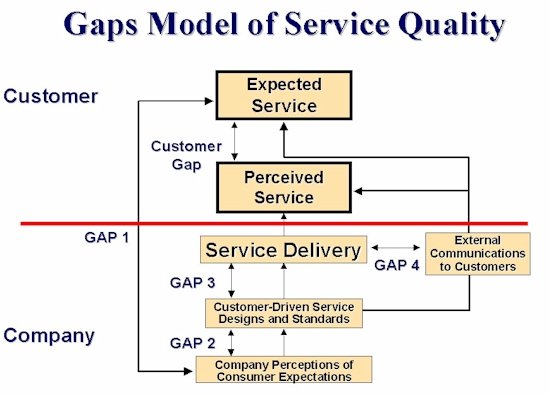Customer Satisfaction and Expectations
Aramex Company is an international service provider whose service provisions are characterised by the pursuit of quality as an overall organizational goal. Therefore, an analysis of its services affords an understanding of the service quality, expectations of customers, and the quality gap quality gap model. The company is one of the case studies that are successful in service provision. However, the need to analyse and identify quality gaps based on the gaps model is vital in its pursuit of business goals.
Based on the Aramex Company case study, the management and sales executives handle customer complaints promptly once they are raised. They have good listening abilities and communicate effectively (Lovelock, 99). Sales agents make after sales follow-ups and continuously inform the customer on new changes in the product, creating customer value.
Promises made by the company executives and sales agents are always true, thus inculcating a sense of customer satisfaction, confidence and always strive to provide customers with alternative services that targeted at meeting their needs and expectations. Customer satisfaction is a key component in their business operations.
One such incident that illustrates the approach to the integration of the quality component in its services is discussed hereafter. A customer enquired at the sales and marketing department with one of the representatives, the Aramex Company representatives aggregated their efforts to attend to the customer complaint about the customer’s bag that had been misplaced.
Shortly after, the customer was kept waiting for a few minutes before a satisfactory response was given to the customer. Every effort was made to track the bag that was eventually handed over to the customer, to the customer’s satisfaction. Departmental employees exerted a synergistic pursuit in search of the lost item, to the satisfaction of the customer, and meeting customer expectations (Lovelock, 23).
Lovelock argues that justice, and fairplay are fundamental elements to consider in service provision activities, with compensation plans integrated into the system in the event of failure to deliver products according to customer needs and expectations (24). Therefore, distributive justice formed an important asset in the administration of justice (Lovelock, 50).
Performance enhancement plans are laid down by the company’s management which outline standards and expectations from employees in service provision, focused at customer satisfaction and expectations. The company incorporates employee education on the need for quality service provisions while closely monitoring their productivity in the service industry. Effective Communications across departments, vertically, and horizontally is another aspect that drives the organization to its success (Lovelock, 40).
Highly trained and skilled personnel are assigned duties that require skilled manpower. These include employees like Mohammed who are well skilled in the provision of services.
Customers remain a key asset in any business organization. It’s through customizers that an organization generates profits and sustains itself. Therefore, the company enhances its service deliveries by integrating customer friendly service deliveries such as talking with customers and providing incentives.
In addition to that, the company provides factual information on what they offer and how they offer what they have. These inspire customer confidence and maintain customer loyalty. Lovelock notes that the company executives are well trained on appropriate marketing, management, and leadership skills (100).
Based on the Gaps model, a close study and analysis of the case study indicates that Aramex Company has not integrated good communication plans between the internal market planning and service production in the context of external service production. Services provision remains a fundamental component of a service provider.

Source: Journal of Service Marketing
The model indicates the existence of a gap between customer expectations and perceived services. According to the case study, all the departments ought to identify the gaps that exist between them and close them in relation to the customer and the consumer. A good communication link should exist between the customer driven service designs and standards and company perceptions and consumer expectations (Burnett, 19).
If the company integrates these elements in the provision of services as outlined in both models, there will be a turnaround in service provision that could be of good quality leading to customer satisfaction and retention. These could in turn lead the company to improve its image leading to high profit generation and a sustainable business.
The service quality model reflective of the Aramex Company is characterised by reliability, assurance, reliability, tangibles, empathy, and responsiveness. Service delivery should be reliable to avoid a scenario of a customer making after sales requests for a service that should have been provided at the point of sale.
In addition, customers should be assured of product and service delivery to inspire confidence in them, tangibles should be appropriately delivered by the sales representatives at the appropriate time, empathy should be the cornerstone in the business transactions of the organization, and responsiveness should be firmly integrated in day to day business transactions of the Company.
Works Cited
Burnett, John J. Journal of Service Marketing. What Services Marketers Need to Know about the Mobility- disabled consumer. Mcpup Ltd 10 (1996).
Lovelock, Christopher. H. Services marketing. 2nd ed. Englewood Cliffs, New Jersey: Prentice Hall, 1991.